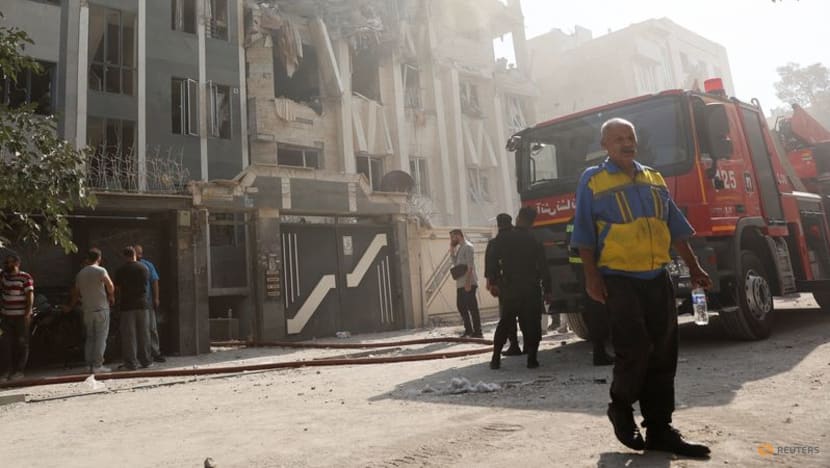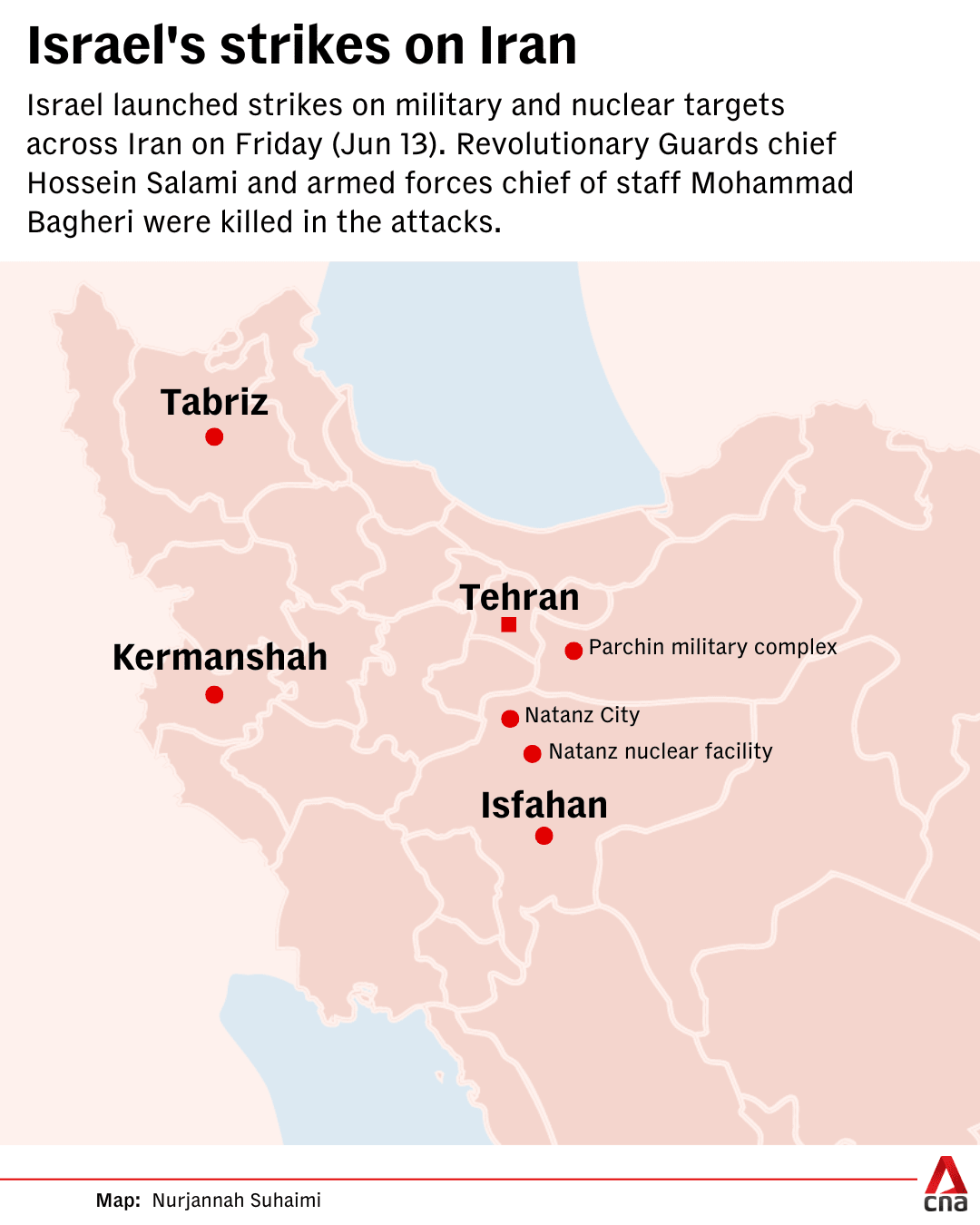Israel-Iran tensions escalate: How proxies, nuclear ambitions are fuelling crisis
In a major escalation, Israel on Jun 13 launched airstrikes against Iran’s military targets and nuclear program, as well as targeting scientists and generals.

Rescuers work at the scene of a damaged building in the aftermath of Israeli strikes, in Tehran, Iran, Jun 13, 2025. (Photo: Reuters/Majid Asgaripour/West Asia News Agency)

This audio is generated by an AI tool.
The conflict between Israel and Iran has shaped the Middle East for decades. It was largely on a low boil as the two sides attacked each other - mostly quietly and in Iran’s case often by proxy - while avoiding a full-blown war.
The hostilities stepped up a gear following the outbreak of war between Israel and the Palestinian group Hamas, which is backed by Iran, in October 2023. Since then, the countries have exchanged fire on each other’s homelands in isolated incidents using missiles and drones.
Then, in a major escalation, Israel on Jun 13 launched airstrikes against Iran’s military targets and nuclear programme, as well as targeting scientists and generals. Explosions were seen and heard in the capital city, Tehran.
The head of the Islamic Revolutionary Guard Corps, Hossein Salami, was killed in the strikes, according to Iranian state television. Due to its “pre-emptive strike”, Israel declared a state of emergency.
An escalation to open warfare could be a real possibility amid renewed focus on Iran’s nuclear capabilities. Israel, which is widely believed to have nuclear weapons of its own, has long considered Iran’s potential to build atomic weapons a threat to its existence.
Why are Israel and Iran enemies?
Israel and Iran were allies starting in the 1950s during the reign of Iran’s last monarch, Shah Mohammad Reza Pahlavi, but the friendship abruptly ended with the Islamic revolution in Iran in 1979.
Iran’s new leaders called for the destruction of Israel, decrying the Jewish state as an imperialist power in the Middle East. Iran has supported groups that regularly fight Israel, notably Hamas, Hezbollah and the Houthi rebels, all of which the US considers terrorist organisations.
Israel regards the possibility of a nuclear-armed Iran as an existential risk. Israeli officials have repeatedly implied that if Iran were to reach the brink of weapons capability, Israeli forces would attack its nuclear programme using air power, as they did when they struck a reactor in Iraq in 1981 and an alleged Syrian nuclear site in 2007.
Have Israel and Iran attacked each other previously?
Prior to Israel’s Jun 13 attack on Iran, the two countries exchanged direct blows for the first time in April 2024 when Iran launched a massive missile and drone attack on Israel. This was precipitated by an airstrike two weeks earlier on Iran’s diplomatic buildings in the Syrian capital Damascus. The airstrike was widely attributed to, but not acknowledged by, Israel.
While Iran’s attack caused minimal damage and provoked a more limited return assault by Israel, the head-to-head fighting moved the conflict between the two countries to a more dangerous phase, creating a precedent for overt, direct fighting.
Israel assassinated Hamas’s political leader, Ismail Haniyeh, in the heart of the Iranian capital in July that same year. Another bout of missile attacks and airstrikes was exchanged by the two sides in October.

How do Israel and Iran’s military capabilities compare?
Israel’s forces have a vast technological edge over Iran’s. That’s partly due to military and financial support from the US, which has long sought to ensure Israel’s advantage as part of its commitment to the Jewish state’s security. Israel is the only state in the Middle East so far that has bought Lockheed Martin’s F-35 stealth fighter jet - the costliest weapons system ever. It’s also widely believed to have nuclear weapons, though it has never acknowledged them.
Iran, meanwhile, has long been suspected of harbouring the goal of using its nuclear power programme to build atomic weapons - an ambition it has repeatedly denied having.
The country’s reserves of highly enriched uranium have been growing and could quickly be purified to the 90 per cent level typically used in nuclear weapons, should the leaders of the Islamic Republic choose to do so. Still, Iran would have to master the process of weaponising the fuel in order to produce an operable device capable of hitting a remote target.
Sanctions and political isolation have hobbled Iran’s access to foreign military technology, driving it to develop its own weapons. Its combat aircraft are mostly older models inherited from before the country’s 1979 revolution. Iran hopes to upgrade its military capabilities through increased collaboration with Russia. It agreed to buy Sukhoi Su-35 fighter jets, although it’s unclear if the aircraft have been delivered.
Though at a technological disadvantage, Iran’s military is thought to have a significant stockpile of the ballistic and cruise missiles and cheap unmanned aerial vehicles, or drones, that it deployed against Israel in its 2024 assaults.
As Iran learned in those attacks, penetrating Israel’s substantial air defences is a challenge. First, it must get past Israeli Air Force fighters. Then there are Israel’s Arrow and David’s Sling air-defence systems, which, together with US and other allied forces in the region, intercepted 99 per cent of the more than 300 drones and missiles Iran fired in the April 2024 barrage, according to Israel’s military.
Iran’s own defensive arsenal includes surface-to-air missile systems, including Russia’s S-300, to counter aircraft and cruise missiles and the locally made Arman anti-ballistic missile system. These aren’t nearly as battle-tested as Israel’s defences - a testament to Iran’s preference for asymmetric warfare, where it can project outsized power, over head-to-head combat.
Both Israel and Iran have cyberwar capabilities. More than a decade ago, malware known as Stuxnet compromised operations at an Iranian nuclear enrichment facility in what’s suspected to have been a US and Israeli operation.
Iran is capable of “a range of cyber operations, from information operations to destructive attacks against government and commercial networks worldwide”, according to an assessment by the US Defense Intelligence Agency released last year.
Cyberattacks launched by Iran include a hack that sought to cripple computers and water flow for two Israeli districts, according to the Council on Foreign Relations.
How difficult is it for Israel to damage Iran’s nuclear facilities?
Iran’s atomic sites are numerous and dispersed around the country. The most important assets have been moved underground in recent years in an effort to put them out of harm’s way.
That hasn’t stopped smaller-scale sabotage operations that are routinely attributed to Israel. Israel is widely thought to have been behind the assassination in Tehran of five Iranian nuclear scientists since 2010.
In 2021, Iran blamed Israel for an explosion at a key enrichment facility.
Israel says it destroyed most of Iran’s air defence and much of its missile-making capacity in the October 2024 exchange between the two countries, potentially making it easier for Israel to mount a successful attack.
Intelligence officials have warned, however, that strikes on Iran’s nuclear facilities may only delay, not destroy, the country’s ability to piece together the technologies needed to manufacture an atomic weapon.
A senior military official responsible for protecting Iran’s nuclear programme said in April 2024 that the country would retaliate in kind if Israel targeted its assets. He hinted that even the threat of doing so could push Iran to reconsider its policies around what it describes as a peaceful nuclear programme.
Who are Israel and Iran’s allies?
Iran’s most important allies are the Shiite militias in Lebanon, Yemen and Iraq that it supports with money, weapons and training.
The Lebanese militia Hezbollah had long been the strongest of those, but its clashes with Israel since the start of the war in Gaza, including an Israeli ground incursion into Lebanon, have left it seriously weakened. Tehran also lost its only state ally in the Middle East, Syria, with the fall of President Bashar al-Assad in December 2024.
Yemen’s Houthi rebels would likely be eager to play a part in an all-out war between Israel and Iran.
Since the start of the Israel-Hamas conflict, the Houthis have been firing ballistic missiles and drones at Israel, in addition to attacking commercial ships in the Red Sea.
In July 2024, a Houthi drone hit a building in central Tel Aviv, killing a man and injuring several others, in the first deadly attack of its kind on Israel’s soil. In early May 2025, a Houthi missile struck near Israel’s main airport, leading numerous foreign airlines to suspend flights in and out.
Iran has warm relations with Russia, though the latter’s war in Ukraine would likely limit its ability to provide assistance in a conflict. The Islamic Republic also has good ties with China, which has bought Iranian oil even though these barrels remain sanctioned by the US and allies.
As for Israel, US and UK forces helped to destroy some of the missiles and drones Iran launched at the country in 2024. The US military also announced steps to beef up its presence in the Middle East, adding ships, fighter planes and ballistic missile defence vessels.
However, the Israeli operation poses the first major foreign-policy crisis of US President Donald Trump’s second term, after he had repeatedly urged Israel’s Prime Minister Benjamin Netanyahu not to proceed with a strike.
How might Arab states react to a war between Israel and Iran?
Many of the countries in the region would be put in a difficult position. Four Gulf Arab countries made peace deals with Israel in 2020 via the so-called Abraham Accords, in part united by distrust of Iran. But they’ve also sought to mend ties with Tehran as they focus on economic growth at home and after their longtime security guarantor, the US, took steps to disengage from the region. Unlike with previous talks about Iran’s nuclear programme, this time they’re publicly backing diplomacy.
Iran and Saudi Arabia restored diplomatic relations in 2023 after a seven-year freeze. Saudi Arabia has previously explored the possibility of normalising ties with Israel as part of a broader deal in which it hopes to attain US security guarantees, and it would likely try to avoid becoming embroiled in a conflict.
It’s unlikely any Arab state would stand with Israel in an outright confrontation against a fellow Muslim country, let alone one as powerful as Iran. That said, the latest Israeli strikes on Iran may only have required their acquiescence for Israeli jets to travel through their airspace.













